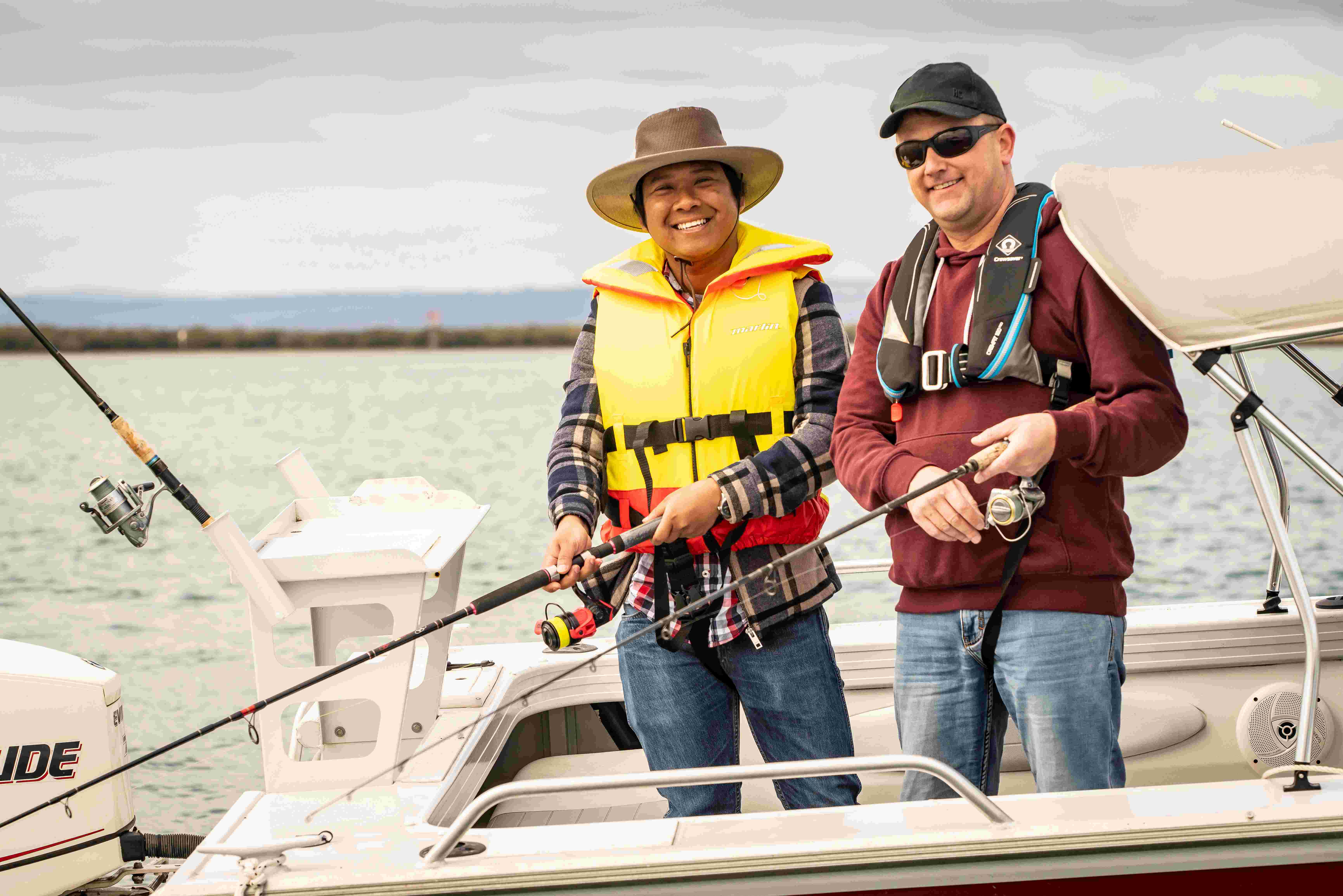Being safe on board
Boat safely on the water by following these steps before setting out, when aboard, when out on the water and what to do if your boating trip goes wrong.

Before setting out
- Check the weather forecast and consider staying ashore if warnings are current or the weather appears doubtful. A general rule to follow is 'if in doubt, don't go out'. Consult the Bureau of Meteorology for South Australian Weather.
- Make sure your boat is seaworthy and drain plugs are tightly inserted.
- Ensure that a responsible person at home knows:
- the description of your boat, including the registration number
- the number of passengers with you
- where you are going
- your expected time of return or arrival.
- Check which type of lifejacket you need. Which lifejacket you need and when you must wear it depends on your vessel, age, location and the conditions.
- Check that all the required safety equipment is on board, in good condition and within easy reach.
- Ensure that you have sufficient supplies of food and water for the trip and some extra in case of an emergency.
- If the vessel has a marine radio make sure that it is working.
- Check that the motor is running properly.
- Make sure you have enough fuel for the return trip plus a margin of at least 50%. It may be calm when you set out but your fuel consumption could double if returning into a headwind or rough seas.
- Check fuel lines and connections for leaks. Wipe up any petrol spilled during fuelling and make sure there are no fumes before starting the engine.
- Check the times of high and low tide before you depart - you don't want to run aground (and access to some boat ramps may be restricted at low tide).
- Check the area for restrictions and speed limits.
When aboard your boat
- Load the boat within its design limitations and boat capacity. Most newer vessels are fitted with a compliance plate, Australian builder's plate (ABP) or both - these plates detail the maximum load capacity for the vessel.
- Allow for rough conditions and distribute the load evenly keeping it as low as possible to maintain the boat's stability.
- Make sure everyone has their lifejacket and puts it on if required. If you’re not sure which lifejacket is needed, answer some quick questions to know before you go.
- Step aboard as near to the centreline of the boat as possible and hold on to something. Never jump into a boat or pause with one foot on the boat and the other on the shore.
- Don't let anyone sit on the bow, especially children, as they could easily lose their balance, fall overboard and be seriously injured or killed by the propeller.
- Avoid standing up in a small boat. If you have to change places with someone, carefully move around opposite sides of the boat so that balance is maintained.
While on the water
- Maintain a good lookout and continually assess the relative position, speed and direction of other vessels in the vicinity.
- Make sure you know all the navigation rules and take action in plenty of time to avoid a collision. Keep clear of larger vessels that cannot manoeuvre as quickly as you.
- Always keep to speed restrictions or limits and travel at a safe speed, particularly when visibility is reduced by sun glare, fog or rain, and when it is dark. Remember your boat has no brakes.
- Keep a constant watch on the weather. If conditions start to deteriorate make sure that everyone on board, including and especially children and others who are not strong swimmers, is wearing a lifejacket. Whenever the weather starts to turn bad, consider heading inshore or returning to shore.
- Don't throw your rubbish over the side - take it home and dispose of it responsibly.
- Don't mix alcohol, drugs and boating.
- Never anchor in channels.
- Be wary if you encounter a whale or dolphin. Specific rules apply to vessels operating near these mammals and strict penalties apply for approaching too near a dolphin or whale.
- If waterskiing follow the special boating rules that apply to this activity.
- Be wary of the effects of carbon monoxide where your vessel is fitted with an engine, generators or fuel burning cooking equipment.
If your boating trip goes wrong
If a boating incident occurs you will need to provide assistance and report the incident. This includes collisions, people falling overboard, a boat being abandoned or engine failure.
The owner, master, or operator of any vessel must report any incident that results in loss of life, personal injury, or property damage to Marine Safety SA or a police officer.
Reports need to be lodged within 48 hours of the incident.
A report is not required where:
- personal injury is minor and does not require medical attention
- property damage is less than $300.
Abandoning a boat
If you have to abandon your boat:
- Make sure that everyone is wearing a lifejacket correctly before going over the side. Surviving in cold water is hard enough without having to stay afloat as well.
- If the boat has a radio, send a distress call. Send off distress flares only if they are likely to be seen - don't waste your small stock of flares.
- Activate your emergency position indicating radio beacon (EPIRB) if you have one.
- Don't leave your boat. Most boats involved in incidents don't sink and are more easily seen by search vessels or aircraft than a person in the water. A partially submerged boat can also be used for support.
- You should generally ignore any impulse to swim ashore. Distances over water usually appear shorter than they actually are. It is always safer to stay with the boat unless you know that land is within comfortable swimming distance. Remember that the combination of your heavy clothing, cold water and the stress of the incident can reduce your normal swimming ability.
- Huddle together to reduce heat loss. Avoid excessive physical activity such as swimming, as this will increase body heat loss.
Engine failure
Even the best-maintained engine can fail, so it is important to:
- learn the basics of engine repair
- practice emergency repairs on your engine
- always carry essential tools.
Before attempting to carry out any running repairs while on the water:
- Use an anchor to minimise boat drift.
- Face the boat bow-first into the sea to help keep water off the engine.
- If possible, work under a waterproof cover large enough to keep spray off the engine. Wet ignition can often frustrate attempts to re-start an engine.
Learn to distinguish the sound of an engine that is not running normally, because you may be able to avoid a complete breakdown.
It is good practice, especially on larger vessels, to carry an auxiliary motor that is maintained in good operational order and ready for immediate use if required. If you are a long way from shore you don't want to have to rely on rowing back to shore.
Person overboard
Boating fatalities are not common in South Australia, but when they do happen it's usually when people fall overboard. This can happen even in calm waters and close to shore.
If somebody falls overboard:
- The operator or master should swing the boat's stern, the back of the boat, away from the person. In other words if they fall over the port side, turn to port to avoid them being injured or killed by the propeller.
- Quickly throw the person overboard a lifesaving device such as a life buoy, personal flotation device or buoyant cushion.
- Keep the person overboard in sight at all times. If possible, get someone to act as a lookout while the operator manoeuvres the boat. At night, use the best available light to illuminate the area.
- Try to approach the person overboard from downwind or into the sea. Help them aboard and if lifting them over the stern, make sure you stop the engine first.


